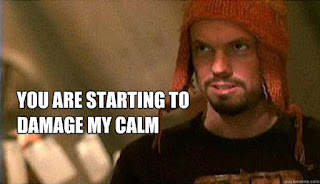*Spoilers about Great Expectations*
[Gif Credit: thatonemoviechick.tumblr.com]
I just finished Great Expectations. For those who don't know, it's split into three 'books' (or parts). I was with it during book one: Pip meets a convict, Pip is nice to people, Pip is summoned mysteriously to places and made to walk an old lady around a room etc etc...lots of odd, kooky things occur. It sets up some Great Expectations.
Then book two happens. I honesty don't know if I understood what was happening through a lot of book two. Perhaps I wasn't in the right 'zone'. Much of book two passed me by in a blur. Why is Pip called Handel? What? Not much happened here IMO that was relevant to the greater plot. I struggled.
My favourite quote from the whole book did actually happen in part two though (just to contradict myself). It reads:
"We spent as much money as we could, and got as little for it as people could make up their minds to give us. We were always more or less miserable, and most of our acquaintance were in the same condition. There was a gay fiction among us that we were constantly enjoying ourselves, and a skeleton truth that we never did. To the best of my belief, our case was in the last aspect a rather common one." (Chapter 34, Page 275).
Isn't that a beauty?
Book three. Things get shocking and reveal-y. I sort of managed to pick it up again here. But Pip's whining opinions and mood swings go on for so long it's hard to remain focused. However all the oddness and kookyness from earlier does get wrapped up in one way or another, so if you like neat endings then this might be the book for you.
[Side note] Pip really is a horrible person sometimes. The worst thing is, he knows this most of the time, feels guilt-ridden for most of the book BUT STILL DOES NOTHING ABOUT IT until the end of the book. I'm glad he went home to find Biddy married to Joe. He deserved her not. [Grumble over].
So what's my drama? In total contrast to G.E, I have read David Copperfield and Oliver Twist, and both I enjoyed hugely and wished there was more to read at the end. SO MUCH LOVE FOR THOSE BOOKS. On a different note, I have also read A Christmas Carol, and during this, kinda wished the first spirit had killed Mr Scrooge off to spare us reading the rest.
Why do I have this love/hate relationship with Dickens books? It's putting me off reading any more in case I find it a total snooze-fest like G.E. Butttttt do I give him one more chance and read one more, just in case I find another fav like Oliver Twist? I don't know. This has been my Dickens Drama. Any suggestions/help greatly appreciated.
Over and out.



















